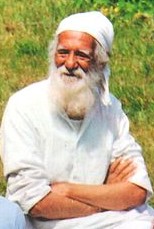
Sundarlal Bahuguna
“Himalaya is a land of penance. Nothing in the world can be achieved without penance. I am doing this on behalf of all who are striving to save our dying planet. Why should a river, a mountain, a forest, or the ocean be killed, while we cling to life?”
This is what Sunderlal Bahuguna wrote to his friends when he undertook a second long fast in 1996 on the banks of the Bhagirathi River demanding a review of the Tehri Dam Project. He broke the fast on the seventy-fourth day on an assurance given by the then Prime Minister that the project would be reviewed. (It was not, but that is another story.)
The making of an activist
A two-minute conversation (when he was thirteen) with Dev Suman, a Gandhian and a freedom fighter, completely changed the life of Sunderlal. He joined the non-violence movement, organized students, and was sent to jail even as a young boy. After Independence he followed Gandhi’s injunction that all the freedom fighters should go and work in the villages. Bahuguna, and his equally committed wife Vimla, have been living in the Himalayas, working for the welfare of dalits, lobbying against deforestation, encouraging forest-based small-scale industry, and campaigning to save the Himalayan ecology.
Chipko Movement and Tehri Dam struggle
Bahuguna became well known when he led the Chipko Movement against the commercial felling of trees in the Himalayas. In 1981, Bahuguna walked 4800 km across the Himalayas, from Kashmir to Kohima, carrying the message: ‘Save the tree, save the future.’ On the way, his group held meetings in countless villages—on the environment and development issues, talked to children, and learnt of the problems faced by the people.
Later, Bahuguna led the struggle against the building of the huge Tehri Dam, set to displace 25,000 people and devastate one of the most sacred and beautiful landscapes. He was (and still is) convinced that the dam would destroy the Garhwal-Kumaon Himalayas and create a perpetual threat of floods. In the true Gandhian tradition, he went on fast several times on the Tehri issue. In spite of all the efforts of Bahuguna and others, the Tehri Dam was built and the old Tehri town went under water.
Bahuguna, however, was undeterred. He said, “My fight is to save the Himalayas, and it will continue. My movement has not gone to waste because it will give strength and direction to the fight ahead. Sooner or later my voice will be heard. Truth never dies, it ultimately prevails, no matter what. Our goal is to have a comprehensive Himalaya policy to save the hills. The Himalayas are a mountain of emotions, not rocks and boulders, and we must preserve and nurture it to save our culture, to save our souls.”
Bahuguna is the recipient of several awards: Padma Shri and Padma Vibhushan, Right Livelihood Award, Jamnalal Bajaj Award, and others.
Sundarlal Bahuguna turned 93 in January 2020.
Afterword: There is a book on Bahuguna and his thought: Ecology Is Permanent Economy: The Activism and Environmental Philosophy of Sunderlal Bahuguna by George Alfred James. You can find a number of videos on Bahuguna, Tehri Dam, and Chipko Movement on YouTube.

Yes, we have been hearing him and his endeavours very often. Undeterred he has kept up his spirit to fight for a cause. As we know governments felicitate actions but fail to keep up with the spirit of such actions. The point it makes is that, it is in public interest or that it is for a public cause. As lay public, we go with the actions of the government so long as it does not presently affect us. It is this apathy that needs to change.